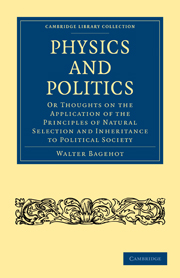 Physics and Politics
Physics and Politics II - THE USE OF CONFLICT
Published online by Cambridge University Press: 05 July 2011
Summary
‘The difference between progression and stationary inaction,’ says one of our greatest living writers, ‘is one of the great secrets which science has yet to penetrate.’ I am sure I do not pretend that I can completely penetrate it; but it undoubtedly seems to me that the problem is on the verge of solution, and that scientific successes in kindred fields by analogy suggest some principles which wholly remove many of its difficulties, and indicate the sort of way in which those which remain may hereafter be removed too.
But what is the problem? Common English, I might perhaps say common civilised thought, ignores it. Our habitual instructors, our ordinary conversation, our inevitable and ineradicable prejudices tend to make us think that ‘Progress’ is the normal fact in human society, the fact which we should expect to see, the fact which we should be surprised if we did not see. But history refutes this. The ancients had no conception of progress; they did not so much as reject the idea; they did not even entertain the idea. Oriental nations are just the same now. Since history began they have always been what they are. Savages, again, do not improve; they hardly seem to have the basis on which to build, much less the material to put up anything worth having. Only a few nations, and those of European origin, advance; and yet these think—seem irresistibly compelled to think—such advance to be inevitable, natural, and eternal. Why then is this great contrast?
- Type
- Chapter
- Information
- Physics and PoliticsOr Thoughts on the Application of the Principles of Natural Selection and Inheritance to Political Society, pp. 41 - 80Publisher: Cambridge University PressPrint publication year: 2010First published in: 1873


